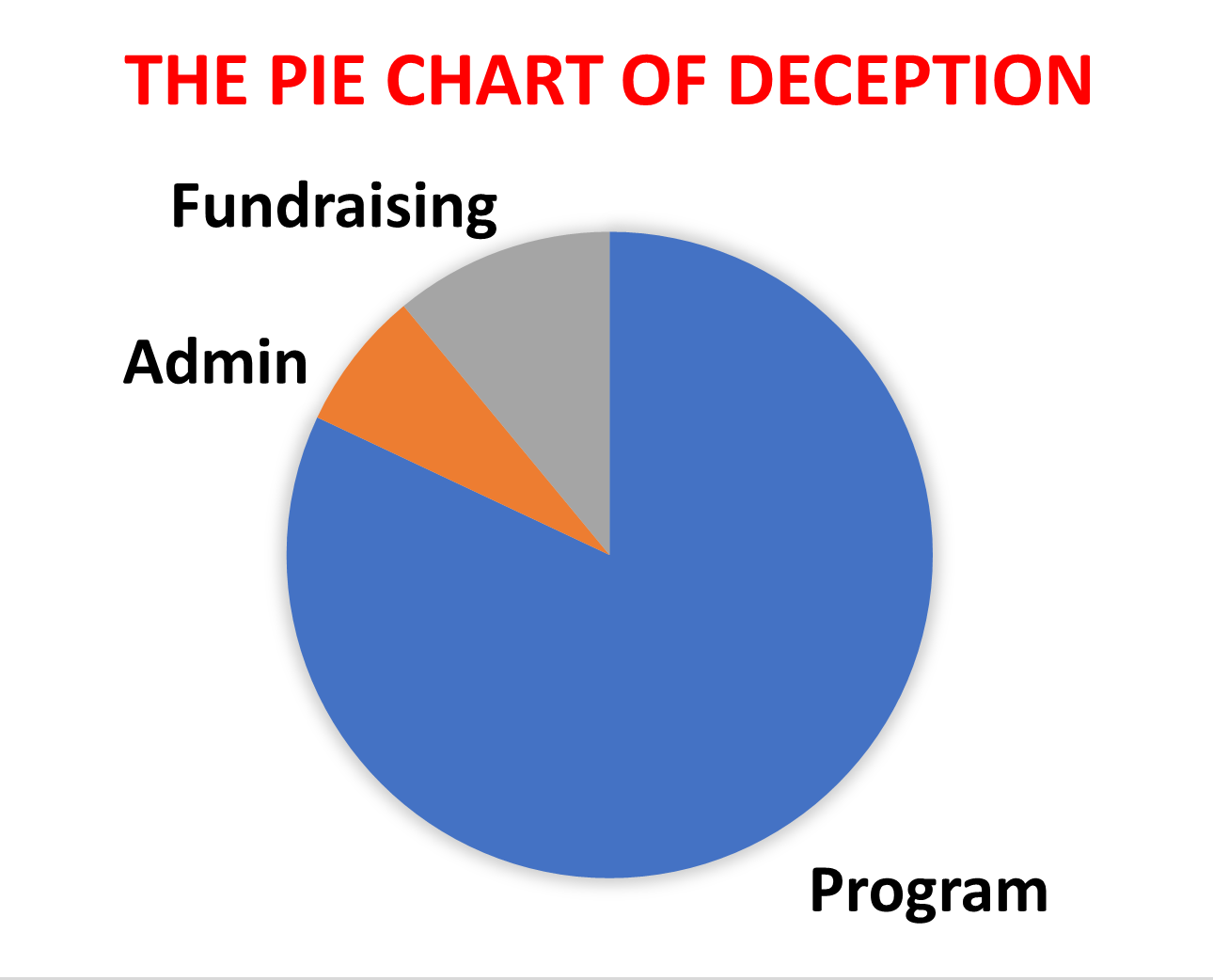 When selecting charities to support, don’t fall into the trap of using the Pie Chart of Deception (see graphic) to compare organizations. Focusing solely on this chart to determine an organization’s effectiveness will mislead you!
When selecting charities to support, don’t fall into the trap of using the Pie Chart of Deception (see graphic) to compare organizations. Focusing solely on this chart to determine an organization’s effectiveness will mislead you!
Breaking down expenses into the categories that make up the “pieces of pie” is required by the IRS as part of our tax return to ensure we are a legitimate 501c3 and keep our tax-exempt status. That’s its sole purpose!
Unfortunately, the pie chart has been used as an easy, visually appealing assessment to quickly compare organizations and measure efficiency and value. The assumption is that the larger the piece of Program pie (direct program delivery costs), the better value for the donor. The other two categories are referred to as “overhead” or infrastructure.
Here are the top three reasons that method is deceptive and why savvy donors and charity watchdogs don’t put much faith in it:
The Pie Chart of Distortion.
The IRS guidelines are vague enough to be used by nonprofits of all sizes and missions. As a result, the rules for determining which kind of expenses go in which category are imprecise and take away the usefulness of the ratio as a tool to compare organizations across the sector.
For example, you wouldn’t expect a food pantry with a $250,000 budget to have the same business model as a $1 billion hospital, would you?
WARM relies on an annual audit, conducted by a third-party CPA, to allocate costs into those three categories in ways that are appropriate to WARM.
The Pie Chart of Distraction.
Too much focus on the pie chart makes it easy to miss the real purpose of philanthropy.
During an interview for a grant, I was once asked, “What expenses are in the Office Supplies category?” I was floored; it is approximately 1% of our organizational budget. The interviewer never asked about our quality control, financial sustainability, or long-term outcomes. It was demoralizing.
Let’s not take our eye off the ball!
Nonprofits should primarily be held accountable for making transformational change in our communities. Critical infrastructure and operating expenses are necessary to make the world a better place to live.
Push us to reduce the poverty level by 25%, recover from a major hurricane in less than six years, end childhood hunger.
But pushing us to spend more time counting paperclips? I think we can do better than that.
I like how activist and entrepreneur Dan Pallotta puts it, “Our generation does not want its epitaph to read ‘We kept charity overhead low.’” (16:53 in video)
The Pie Chart of Deprivation.
Too much emphasis on today’s expenses discourages investment in the future.
I can’t put it any better than Charity Navigator, Guidestar, and BBB Wise Giving Alliance wrote in their open letter to donors:
Overhead costs include important investments charities make to improve their work: investments in training, planning, evaluation, and internal systems—as well as their efforts to raise money so they can operate their programs. These expenses allow a charity to sustain itself (the way a family has to pay the electric bill) or to improve itself (the way a family might invest in college tuition).
When we focus solely or predominantly on overhead, …we starve charities of the freedom they need to best serve the people and communities they are trying to serve.
By investing in equipment, people, marketing, and technology for well over a decade, WARM has grown by an average of 14% per year. We’ve gone from serving 44 households annually (2008) to serving 160-180 and more than doubled our service area!
In 2023, we will open a Center for Homeownership downtown that will unite our partners to identify and address threats to homeownership beyond home repairs such as heirs property issues.
Discard the Pie Chart
Without relying on the pie chart, donors can review more sophisticated evaluations and make wiser decisions. Charity Navigator offers a robust assessment of Financial Accountability. Nine categories, including board composition, conflict of interest and whistleblower policies, balance sheet information, and annual audit documents, give a full and complete analysis of a charity’s financial practices. WARM is proud to have a Four (out of four) Star rating with a 97% Financial Accountability score.
Discarding the pie chart in place of a full menu of information makes your donation more valuable, making a greater difference in your community, and bringing us all closer to the world we work toward – where charity is no longer needed, and everyone does well.
City Club, Event Center On The Market For $7.5 Million
Emma Dill
-
Apr 16, 2024
|
|
Wilmington Tech Company Tapped For Federal Forestry Contract
Audrey Elsberry
-
Apr 15, 2024
|
|
Commercial Real Estate Firm Promotes Adams, Mitchell To Vice President Roles
Staff Reports
-
Apr 16, 2024
|
|
New Hanover Industrial Park To Get $3.3M In Incentives For Expansion, New Jobs
Emma Dill
-
Apr 15, 2024
|
|
Gravette Named Executive Director Of Nir Family YMCA
Staff Reports
-
Apr 16, 2024
|
|
CFCC recently announced its emergency medical services program has achieved accreditation from the Commission on Accreditation of Allied Hea...

Local leaders in Wilmington and New Hanover County have been working together to allocate money from two nationwide opioid settlement agreem...
For the Business Journal's annual Law Issue, read about area attorney's who made this year's Legal Elite list....
The 2024 WilmingtonBiz: Book on Business is an annual publication showcasing the Wilmington region as a center of business.
